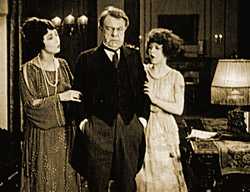Beyond the Rainbow
| Beyond the Rainbow | |
|---|---|
 | |
| Directed by | Christy Cabanne |
| Written by |
Christy Cabanne Loila Brooks (adaptation) Eustace Hale Ball (adaptation) |
| Based on |
"The Price of Feathers" by Solita Solano |
| Starring |
Harry T. Morey Billie Dove Clara Bow |
| Cinematography |
Philip Armand William H. Tuers |
| Distributed by | Robertson-Cole Pictures |
| Release dates |
|
| Country | United States |
| Language |
Silent English intertitles |
Beyond the Rainbow is a 1922 American silent drama film starring Billie Dove and Harry T. Morey. The film is also notable as the first film actress Clara Bow appeared in.[1] A 16mm print of the film is in the collection of the UCLA Film and Television Archive.
Synopsis
Virginia Gardner, a flapper girl, is left out of a fashionable party thrown by her mother (Helen Ware). To get revenge, she plays a joke by passing out notes to some of the guests reading, "Consult your conscience. Your secret is common gossip." This message sends a number of people into a panic during the party, and a shot rings out, wounding one of the men. When the mystery is cleared up, Marion Taylor (Billie Dove) and Edward Mallory (Harry Morey) have fallen in love.[2]
Cast

- Harry T. Morey
- Billie Dove
- Diana Allen
- James Harrison
- Macey Harlam
- Rose Coghlan
- George Fawcett
- Marguerite Courtot
- Edmund Breese
- Walter Miller
- Charles Craig
- Clara Bow
- Huntley Gordon
- Helen Ware
Production notes
Clara Bow made her film debut in Beyond the Rainbow after winning a beauty and acting magazine sponsored contest. She filmed five scenes but, after seeing the film in Brooklyn, thought that she was cut from the film. Bow was devastated and put temporarily her acting ambitions aside.[3] However, newspaper advertisements and editorial comments suggests she was not cut at all, at least not from the main release.[4][5]
References
- ↑ Beyond the Rainbow at the silentera.com database
- ↑ Synopsis at NY Times Movie Database
- ↑ Photoplay magazine (February 1928)
- ↑ Oakland Tribune, June 5, 1922
- ↑ Weekly Variety, November 10, 1922